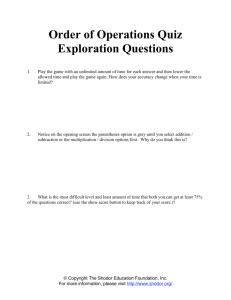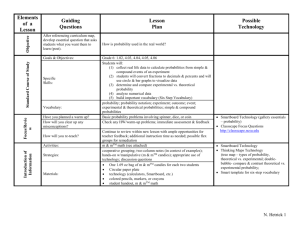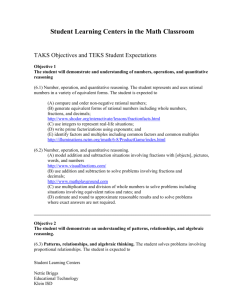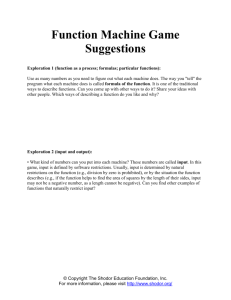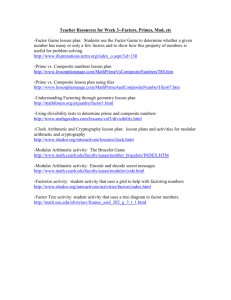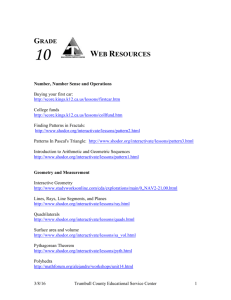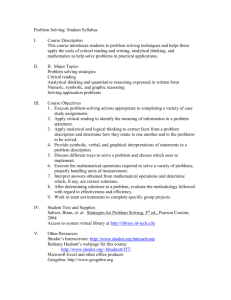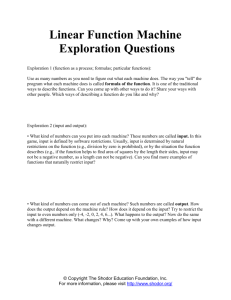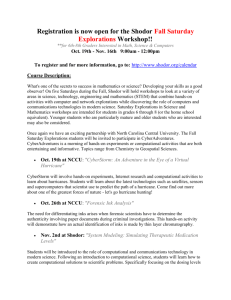Pre Algebra ~ Math 8 Websites SOL Practice
advertisement
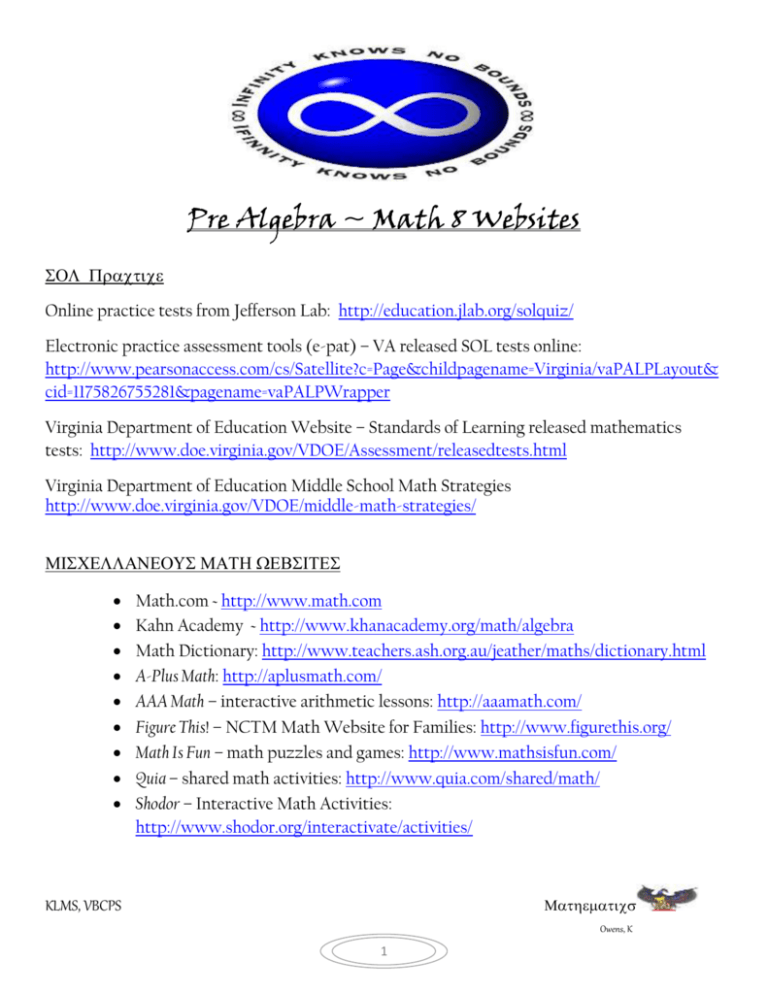
Pre Algebra ~ Math 8 Websites Online practice tests from Jefferson Lab: http://education.jlab.org/solquiz/ Electronic practice assessment tools (e-pat) – VA released SOL tests online: http://www.pearsonaccess.com/cs/Satellite?c=Page&childpagename=Virginia/vaPALPLayout& cid=1175826755281&pagename=vaPALPWrapper Virginia Department of Education Website – Standards of Learning released mathematics tests: http://www.doe.virginia.gov/VDOE/Assessment/releasedtests.html Virginia Department of Education Middle School Math Strategies http://www.doe.virginia.gov/VDOE/middle-math-strategies/ Math.com ~ http://www.math.com Kahn Academy ~ http://www.khanacademy.org/math/algebra Math Dictionary: http://www.teachers.ash.org.au/jeather/maths/dictionary.html A-Plus Math: http://aplusmath.com/ AAA Math – interactive arithmetic lessons: http://aaamath.com/ Figure This! – NCTM Math Website for Families: http://www.figurethis.org/ Math Is Fun – math puzzles and games: http://www.mathsisfun.com/ Quia – shared math activities: http://www.quia.com/shared/math/ Shodor – Interactive Math Activities: http://www.shodor.org/interactivate/activities/ KLMS, VBCPS Owens, K 1 STANDARDS OF LEARNING () SOL 8.1 The student will a) simplify numerical expressions involving positive exponents, using rational numbers, order of operations, and properties of operations with real numbers; Definitions, explanations, practice order of operations and exponent problems: http://www.math.com/students/practice.html Integers and number lines: http://www.learningwave.com/chapters/integers/numline.html Properties of real numbers: http://www.math.com/school/subject2/lessons/S2U2L1DP.html Properties of real numbers flash cards: http://www.quia.com/jg/332031.html Order of operations practice: http://www.scienceacademy.com/BI/mr.htm Adding Integers game: http://www.quia.com/cc/1666.html Adding Positive/Negative Numbers: http://www.quia.com/mc/1666.html Addition/Subtraction/Multiplication/Division of Positive/Negative Numbers: http://www.funbrain.com/cgi-bin/osa.cgi?A1=s&A2=4 b) recognize, represent, compare, and order numbers expressed in scientific notation; and Scientific notation practice: http://www.edinformatics.com/math_science/scinot.htm Scientific notation quiz: http://www.quia.com/quiz/113578.html Converting decimal numbers to scientific notation: http://www.aaamath.com/dec71i-dec2sci.html c) compare and order decimals, fractions, percents, and numbers written in scientific notation. What is a percentage? tutorial http://www.tv411.org/lessons/cfm/math.cfm?str=math&num=8&act=1 Using percentages – interactive tutorial http://www.tv411.org/lessons/cfm/math.cfm?str=math&num=10&act=1 Sports math hunt – decimals and percentages http://teacher.scholastic.com/mathhunt/StartGame.asp?QuizID=12 Ordering integers – pick level 3 of this game http://www.bbc.co.uk/education/mathsfile/shockwave/games/laddergame.html KLMS, VBCPS Owens, K 2 Compare and order decimals: http://www.explorelearning.com/index.cfm?method=cResource.dspDetail&Resou rceID=208 Fraction four game: conversions; operations with fractions: http://www.shodor.org/interactivate/activities/FractionFour/ 8.2: The student will describe orally and in writing the relationship between the subsets of the real number system. Identify rational and irrational numbers: http://www.quia.com/pop/37541.html Subsets of real numbers: http://www.quia.com/rr/104833.html 8.3: The student will solve practical problems involving rational numbers, percents, ratios, and proportions. Problems will be of varying complexities and will involve real-life data, such as finding a discount and discount prices and balancing a checkbook. Great Cartoon treasure hunt – questions about proportions: http://www.themathlab.com/Algebra/basics/cartoontreasure.htm Customizable proportion problems: http://www.themathlab.com/Algebra/proportional%20thinking%20and%20pro bability/proportionstuff/proppbsday1.htm Grid Game – solve practical problems involving factors, multiples, powers, prime and triangular numbers: http://www.bbc.co.uk/education/mathsfile/shockwave/games/gridgame.html Solving proportions – Be A Millionaire game: http://www.quia.com/servlets/quia.activities.common.ActivityPlayer?AP_rand=1 796132559&AP_activityType=10&AP_urlId=35675&AP_continuePlay=true&id=3 5675 Explore the relation between ratio of lengths of width and height and the one of rectangle areas: http://www.ies.co.jp/math/java/geo/ratioAB/ratioAB.html Mathematics of maps: http://math.rice.edu/%7Elanius/pres/map/mapque.html 8.4: The student will apply the order of operations to evaluate algebraic expressions for given replacement values of the variables. Problems will be limited to positive exponents. Exponents – tutorial: http://www.math.com/school/subject2/lessons/S2U2L2GL.html Order of Operations – tutorial: http://www.math.com/school/subject2/lessons/S2U1L2GL.html#sm1 KLMS, VBCPS Owens, K 3 Order of Operations with Exponents Activity: http://www.mathgoodies.com/lessons/vol7/operations_exponents.html Order of Operations Game: http://www.quia.com/cm/16544.html 8.5: The student will, given a whole number from 0 to 100, identify it as a perfect square or find the two consecutive whole numbers between which the square root lies. Table of squares and square roots 1 – 100: http://www.tutor.com/Resources/ResourceFrame.aspx?id=4356 8.6: The student will verify by measuring and describe the relationships among vertical angles, supplementary angles, and complementary angles and will measure and draw angles of less than 360°. Students test their knowledge of obtuse, acute, alternate, corresponding and vertical angles: http://www.shodor.org/interactivate/activities/angles/ Game – Shape, Space and Angle Measures: http://www.bbc.co.uk/schools/ks2bitesize/maths/activities/angles.shtml Angles and Parallel Lines: http://www.ies.co.jp/math/java/geo/angle.html Parallel and Perpendicular Lines – Who Wants to Be a Millionaire Game: http://www.quia.com/servlets/quia.activities.common.ActivityPlayer?AP_rand=7 05375459&AP_activityType=10&AP_urlId=35674&playHTML=1&AP_atSessionS tart=true Congruent figures and triangles: http://www.ies.co.jp/math/java/geo/congruent.html Exploring similar figures: http://www.ies.co.jp/math/java/geo/similar.html 8.7: The student will investigate and solve practical problems involving volume and surface area of rectangular solids (prisms), cylinders, cones, and pyramids. Surface Area and Volume Exploration Activity: http://www.shodor.org/interactivate/activities/SurfaceAreaAndVolume/ 8.8: The student will apply transformations (rotate or turn, reflect or flip, translate or slide, and dilate or scale) to geometric figures represented on graph paper. The student will identify applications of transformations, such as tiling, fabric design, art, and scaling. Translate, rotate and reflect interactive exploration: http://www.shodor.org/interactivate/activities/TransmographerTwo/ or http://www.shodor.org/interactivate/activities/Transmographer/ KLMS, VBCPS Owens, K 4 Tessellation interactive activity: http://www.shodor.org/interactivate/activities/tessellate/ 8.9: The student will construct a three-dimensional model, given the top, side, and/or bottom views. Nets of solids: http://www.mathsnet.net/geometry/solid/nets.html 8.10: The student will a) verify the Pythagorean Theorem, using diagrams, concrete materials, and measurement; Squaring the triangle – interactive right triangle showing that a2 + b2 = c2: http://www.shodor.org/interactivate/activities/SquaringTheTriangle/ Animated visual of the Pythagorean Theorem: http://www.nadn.navy.mil/MathDept/mdm/pyth.html Online activities exploring the Pythagorean Theorem: http://www.ies.co.jp/math/java/geo/pythagoras.html Pythagorean Theorem tutorial: http://www.regentsprep.org/Regents/math/geometry/GP13/Pythag.htm b) apply the Pythagorean Theorem to find the missing length of a side of a right triangle when given the lengths of the other two sides. Working with the Pythagorean Theorem: http://www.regentsprep.org/Regents/math/geometry/GP13/PracPyth.htm 8.11: The student will analyze problem situations, including games of chance, board games, or grading scales, and make predictions, using knowledge of probability. Coin Flipping Game: http://shazam.econ.ubc.ca/flip/ Tricky Track Probability Game Template: http://nrich.maths.org/public/viewer.php?obj_id=2150 Experimental Probability Simulator: http://www.shodor.org/interactivate/activities/expprobability/ Probability Simulations: http://www.mathsonline.co.uk/nonmembers/resource/prob/ 8.12: The student will make comparisons, predictions, and inferences, using information displayed in frequency distributions; box-and-whisker plots; scattergrams; line, bar, circle, and picture graphs; and histograms. KLMS, VBCPS Owens, K 5 Interactive Movies – Organizing & Displaying Data: http://www.saskschools.ca/curr_content/byersjmath/datamgmt/students/orgdis/ intmovie.html Create a Graph Online: http://nces.ed.gov/nceskids/createagraph/ Interpret Circle Graphs: http://socrates.bmcc.cuny.edu/cpe/pie.html Interactive Pie Chart: http://www.shodor.org/interactivate/activities/piechart/ Frequency Tables: http://www.shodor.org/interactivate/activities/histogram/ Box & Whisker Plot: http://www.explorelearning.com/index.cfm?method=cResource.dspDetail&Reso urceID=169 Scatter Diagram Generator: http://www.shodor.org/interactivate/activities/OrderedSimplePlot/ Interactive Box Plots: http://nlvm.usu.edu/en/nav/category_g_3_t_5.html Interpreting Data Activity: http://www.bbc.co.uk/schools/ks2bitesize/maths/handling_data.shtml Practice with Data Questions: http://www.regentsprep.org/Regents/math/ALGEBRA/AD3/PracData.htm 8.13: The student will use a matrix to organize and describe data. 8.14: The student will a) describe and represent relations and functions, using tables, graphs, and rules; Patterns in mathematics: http://www.learner.org/teacherslab/math/patterns/index.html Domino Number Patterns: http://nrich.maths.org/public/viewer.php?obj_id=225 Mystery Pattern Finder: http://www.themathlab.com/PreAlgebra/basics/add&.htm#The%20pattern%20is,%20we%20s Create a Graph Online: http://nces.ed.gov/nceskids/createagraph/ Whole Number Cruncher: http://www.shodor.org/interactivate/activities/WholeNumberCruncher/ Coordinates Game: http://www.shodor.org/interactivate/activities/GeneralCoordinates/ Simple Coordinates Game: http://www.shodor.org/interactivate/activities/SimpleCoordinates/ Maze Game: http://www.shodor.org/interactivate/activities/MazeGame/ Chameleon Graphing on the Coordinate Plane: http://mathforum.org/cgraph/cplane/ KLMS, VBCPS Owens, K 6 Mind Reader – Guess My Number: http://www.themathlab.com/magic/mindread.htm Create the Mystery Figure – Lines Worksheet: http://www.themathlab.com/Algebra/lines%20and%20distances/lines.htm b) relate and compare tables, graphs, and rules as different forms of representation for relationships. Function Machine: http://www.shodor.org/interactivate/activities/FunctionMachine/ Linear Function Machine: http://www.shodor.org/interactivate/activities/LinearFunctMachine/ Linear Function and Graphs – Pouring Water into a Container: http://www.ies.co.jp/math/java/geo/lin_line/lin_line.html 8.15: The student will solve two-step equations and inequalities in one variable, using concrete materials, pictorial representations, and paper and pencil. Two-Step Equations and Inequalities: http://www.math.com/school/subject2/lessons/S2U3L6GL.html Solve Multi-Step Linear Equations: http://www.purplemath.com/modules/solvelin2.htm Solving Equations Lessons: http://www.coolmath.com/algebra/06-solvingequations/index.html Solving Inequalities Lessons: http://www.coolmath.com/algebra/07-solvinginequalities/index.html 8.16: The student will graph a linear equation in two variables, in the coordinate plane, using a table of ordered pairs. Using tables, rules and graphs: http://www.explorelearning.com/index.cfm?method=cResource.dspResourcesFo rCourse&CourseID=218 Graphing a line using a table (t-chart): http://www.purplemath.com/modules/graphlin.htm 8.17: The student will create and solve problems, using proportions, formulas, and functions. KLMS, VBCPS Owens, K 7 Customizable Proportion Problems: http://www.themathlab.com/Algebra/proportional%20thinking%20and%20pro bability/proportionstuff/proppbsday1.htm Graphing Ratios: http://www.indiana.edu/%7Eatmat/units/ratio/ratio_s3.htm Brainteasers, Puzzles and Riddles: http://kids.niehs.nih.gov/braint.htm 8.18: The student will use the following algebraic terms appropriately: domain, range, independent variable, and dependent variable. Match written expressions to algebraic expressions: http://www.quia.com/jg/319817.html Working with Like Terms: http://www.quia.com/jg/332031.html Algebraic Mathematics Vocabulary: http://www.math.com/school/subject2/lessons/S2U1L1GL.html Vocabulary Matching, Concentration and Word Search Games: http://www.quia.com/jg/1312.html Algebraic Word Find: http://teachers.henrico.k12.va.us/math/ms/c20708/06Algebra/6-4AlgTerms.html KLMS, VBCPS Owens, K 8
